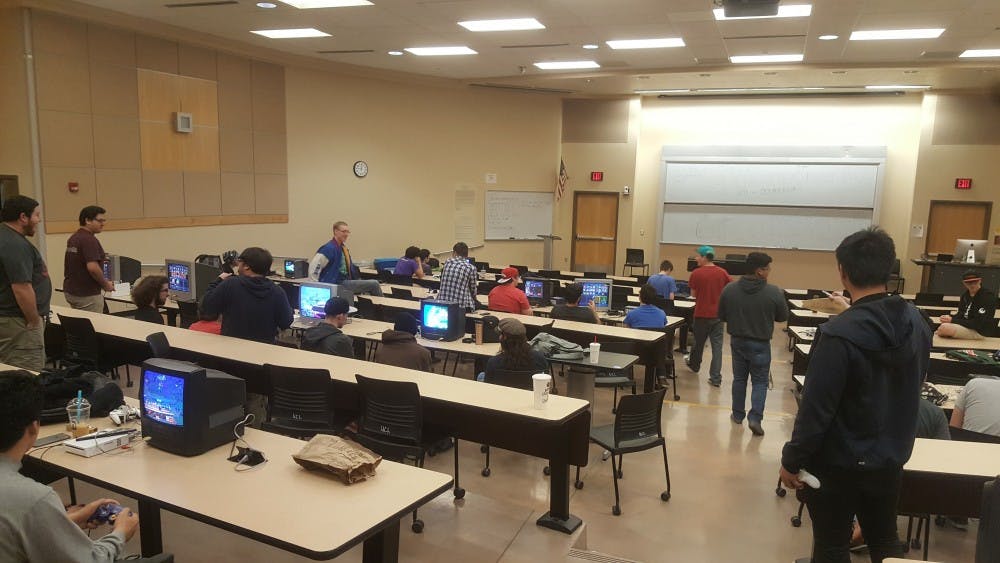One may hear a few choice sounds on a Friday night in the Tempe campus's education lecture hall — some yelps, a gaggle of laughter or perhaps a few defeated groans. However, always present are the clicking sounds of game controllers as players battle for the top spot in the Super Smash Bros. Melee Weekly tournaments.
The "weeklies" see both students and non-students fill the hall with Nintendo GameCube and Wii consoles and CRT televisions to fight their way through a tournament bracket to be the best of the night.
The second entry in Nintendo's popular fighting franchise, Super Smash Bros. Melee, was released for the GameCube in November 2001, and has become a pillar of the so-called "Smash" community for the last 16 years. Hailed for its fast gameplay, the title has seen a place in various tournaments, such as the Evolution Championship Series (EVO) — one of the largest fighting game events in the world.
Clarinet performance and musical education junior Char Elizabeth has run the weekly events for the past two years. She said the tournaments began five to ten years ago when a student tournament organizer gathered top "Melee" players in the area.
"They all started going to ASU on Fridays, and they would meet up in different parts of Barrett," she said. "They started off in some lobbies in the dorms, and they would just start running tournaments every Friday around 7 p.m. And that's how it grew."
Elizabeth said the tournaments continued to outgrow rooms, while remaining "under the table." The rooms were not reserved, and the group was not an official campus club. But the growth continued.
"A lot of people started showing up, started hearing about it and realized they'd be playing with some great players," said Elizabeth, "And (the group) just started exploding."
Three years ago, the "Melee" group was sixty to seventy players strong and inhabiting Cottonwood Lounge. To deal with the growth, the decision was made to start reserving a room through the school's Esports Association, which gave them their current home in the EDC building.
Elizabeth received leadership of the "weeklies" over a year ago.
"I was diagnosed with tendonitis, and I couldn't play the game as much as I wanted to," she said. "So I decided that I would go into tournament organizing and do something for the community."
She organized a "Smash Sisters Crew Battle," at an arcadian-type tournament, where national and locally ranked players are barred from participating. Jeffrey Miller, a graduate and former head of the "Weeklies," gave Elizabeth the job after seeing her performance.
Speaking to the popularity of "Melee" over the more recent version of the game, "Super Smash Bros. for Wii U (Smash 4)," Elizabeth said that the group has kept playing the older title due to the game's presence statewide.
"In Arizona, we are known most for our 'Melee' scene," she said.
"We have a really big scene as compared to (other versions of Smash Bros.)," Elizabeth said. "So naturally, we just have a lot of players who love Melee."
Elizabeth has encouraged other games to be a part of the weekly, with titles such as "Street Fighter" and "Skullgirls" gracing the hall. But the attention has always been focused on Melee, a title that she personally prefers over Smash 4 due to its fast pace.
"When you've been running Melee tournaments for almost ten years, it's kind of hard to get diversity after ten years of almost the same thing," she said with a laugh.
One of Elizabeth's biggest concerns is whether or not she has been as inclusive as she feels she could be.
"The majority of people who come to these tournaments are white college guys," she said. "I always fear that I am maybe scaring off demographics that would be here if it weren't for the overwhelming amount of white men here."
However, Elizabeth said she is trying to promote a more diverse group of players.
"So I try my best to bring my girlfriends or anyone I can get my hands on, and try to be as inclusive as possible," she said. "That's one of my biggest fears — inclusivity and making sure everyone feels at home here."
Currently, the tournaments have around 100 players competing each week.
The competitions are double-elimination, and displayed through the bracket-creation website Challonge. For double-elimination, players who lose once are sent to a "losers bracket" and start from the beginning again. The winner of the losers bracket then challenges the victor of the winner's bracket, in order to crown an overall champion of the evening.
Digital culture and design freshman Max Louis has been attending the weeklies since his first semester at ASU. He said that while he plays both "Melee" and "Smash 4," he enjoys attending the tournaments because of the the competitive scene, and because they are fun.
"It's just a way to meet people to play, because I didn't know about this, and I couldn't find people to play," he said. "I just had my controller. Then I found this, and now I come here every week to play."
Eli Judy has competed in the tournaments since October 2016 and said he had heard about them though a fellow Melee community member. He said that his experience with the tournaments have been "awesome."
"People come here to have fun, and that's exactly what we do here," he said.
Reach the reporter at djulienr@asu.edu or follow @legendpenguin on Twitter
Like The State Press on Facebook and follow @statepress on Twitter




